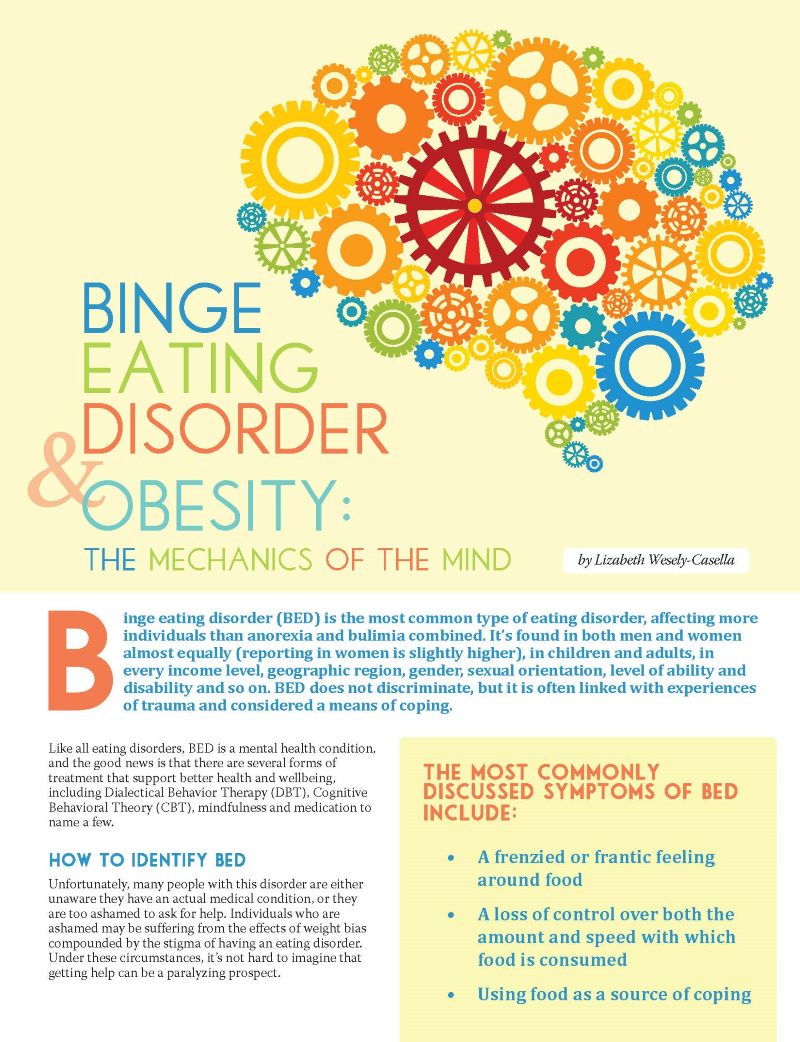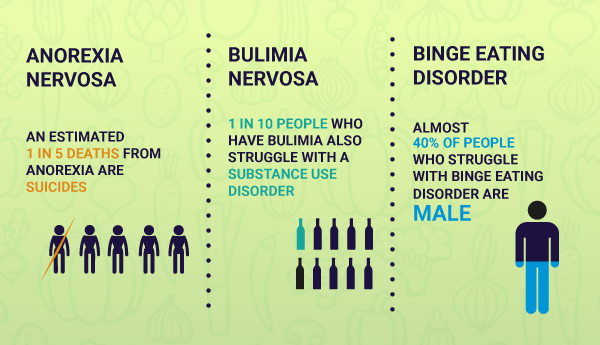Indicators on Eating Disorder Recovery Specialist You Should Know
Wiki Article
Eating Disorder Recovery Specialist Things To Know Before You Get This
Table of ContentsRumored Buzz on Eating Disorder Recovery SpecialistThe 4-Minute Rule for Eating Disorder Recovery Specialist6 Easy Facts About Eating Disorder Recovery Specialist ShownFascination About Eating Disorder Recovery SpecialistGetting The Eating Disorder Recovery Specialist To Work


Food components may likewise become the person's only topic of discussion. Orthorexia is likewise a common co-occurring disorder linked with OCD.
Everything about Eating Disorder Recovery Specialist
With this disorder, a person will purely stay clear of certain foods to the hinderance of their wellness. Unlike orthorexia, nonetheless, the evasion of specific foods isn't driven by concepts of the food's healthiness or pureness, yet rather by a serious hostility to the food's taste, appearance, or smell (although worries concerning spoilage or food poisoning may also exist).With time, more and more foods come to be untenable, bring about an exceptionally restricted palette of acceptable foods. Previously referred to as discerning eating problem, ARFID typically starts in childhood years as well as progressively aggravates with time. It's fairly common for kids to be "picky eaters" and also everyone has choices of what they consume, yet if it becomes uncontrollable and harmful to an individual's health and wellness, it necessitates a check-in with an eating disorder therapy expert.
Additionally like orthorexia, an unfavorable or distorted body picture is not always a root cause of the disorder. ARFID is usually treated utilizing talk treatment as well as cognitive re-training such as Cognitive Behavior Modification (CBT). Unlike many eating disorders which usually first existing during teenage years, rumination disorder is most typical in infancy and very early youth, although it can persist right into their adult years.
Little Known Facts About Eating Disorder Recovery Specialist.
Usually, they do not experience stress or disgust when regurgitating, neither do they show up to make an effort to throw up (as seen in bulimia nervosa). Rumination condition is usually a reaction to an illogical concern of ailment triggered by consuming, although its causes are much less well-understood than various other eating conditions.Rumination disorder is noted in the DSM-V. One of the most unsafe forms of eating problem, ED-DMT1 (colloquially called diabulimia), happens when a person with type-1 diabetes mellitus intentionally avoids their insulin dose to shed weight. Diabulimia is listed as one of the many undefined eating problems under the catchall term OSFED (Various other Specified Feeding r Eating Problem).
Orthorexia is a type of consuming condition, still unacknowledged in the DSM, in which a person becomes obsessed with "healthy and balanced eating." While numerous individuals emphasize to be knowledgeable about the ingredients and sourcing of their food, orthorexia can come to be detrimental to the person's wellness. Orthorexia triggers people to recognize specific food or food teams as "appropriate," "healthy and balanced," my site or "pure." Eventually, specific foods or whole teams are eliminated from the person's diet regimen; they could also begin to obsess over the components in their foods, spending hrs daily planning meals. eating disorder recovery specialist.
How Eating Disorder Recovery Specialist can Save You Time, Stress, and Money.
Food active ingredients might likewise become the individual's only topic of conversation. Wellness repercussions may include a selection of intestinal and dietary imbalances (eating disorder recovery specialist). It can also create numerous of the same wellness dangers as anorexia, as the person's calorie intake may be severely limited. Orthorexia is also a typical co-occurring condition related to OCD.
With this problem, a person will purely stay clear of certain foods to the hinderance of their wellness. Unlike orthorexia, nonetheless, the avoidance of specific foods isn't driven by ideas of the food's healthfulness or purity, however instead by a serious hostility to the food's flavor, texture, or odor (although worries concerning spoilage or gastrointestinal disorder might additionally exist).

Eating Disorder Recovery Specialist - Truths
Likewise like orthorexia, an adverse or distorted body picture is not always a root cause of the disorder. ARFID is usually dealt with utilizing talk treatment and also cognitive re-training such as Cognitive Behavior Modification (CBT). get redirected here Unlike the majority of eating problems which usually initially present during adolescence, rumination problem is most common in infancy and early childhood years, although it can linger right into adulthood.Usually, they do not experience anxiety or disgust when throwing up, neither do they show up to make an initiative to throw up (as seen in bulimia nervosa). Rumination problem is usually a response to an illogical anxiety of disease brought on by eating, although its causes are much less well-understood than other eating disorders.
Rumination disorder is noted in the DSM-V. Diabulimia is listed as one of the numerous unspecified consuming disorders under the catchall term OSFED advice (Other Specified Feeding r Consuming Problem).
Report this wiki page